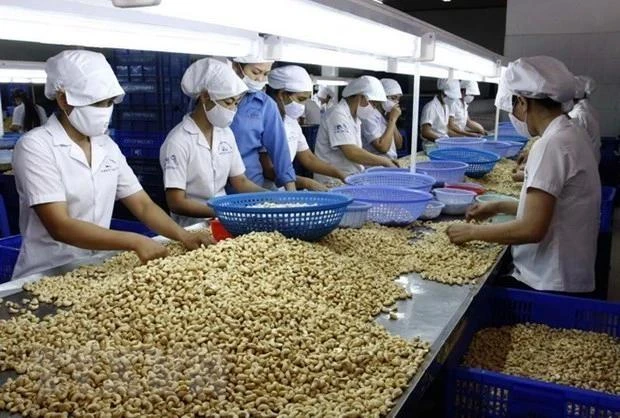Vietnamese agricultural products, food expected for deeper engagement in global supply chain

Cashew nut processing for export. (Photo: VNA)
HCM City (VNA) – Vietnam boasts advantages and potential in agricultural production and export, yet domestic firms need to do more to join the global food supply chain more intensively, insiders have said.
Deputy Minister of Industry and Trade Phan Thi Thang said Vietnam earned over 53 billion USD from agro-forestry-aquatic product exports last year, with many agricultural items like rice, vegetables and fruit, coffee and cashew nuts enjoying increases in both volume and value.
However, she pointed out that Vietnamese exports, mainly raw, have low competitiveness, and have to face a host of challenges regarding quality and traceability requirements set by importers. Besides, the rising protectionism and the trend of sustainable development in Vietnam’s key export markets have also forced businesses to quickly adapt to and observe them.
Le Thanh Hoa, deputy head of the Department of Quality, Processing and Market Development under the Ministry of Agriculture and Rural Development, said free trade agreements (FTAs) have contributed to raising competiveness for Vietnamese agro-forestry-aquatic products thanks to tax commitments.
Vietnam is now the world’s biggest exporter of cashew nuts and pepper, second in coffee and third in rice, the official said, adding Vietnamese aquatic products have also satisfied quality requirements imposed by demanding markets such as the US, the EU, Japan, and the Republic of Korea (RoK) to play a part in their supply chains.
Tran Ngoc Quan, Vietnamese Trade Counsellor in Belgium and the European Union (EU), noted that Vietnam makes up only 4% of the over 160 billion USD worth of agricultural products imported by the EU.
He suggested domestic firms stay updated on market information to better meet requirements in production, transportation as well as sustainable consumption, thus boosting agricultural product and food exports to the bloc.
Vo Trung Hieu, International Business Director of dairy firm Vinamilk, said Vinamilk products have been exported to more than 60 countries worldwide, stressing the company has pursued a sustainable development strategy and sought suitable partners.
He suggested businesses learn about consumption habits and set up a network of partners to expand their markets.
VNA









